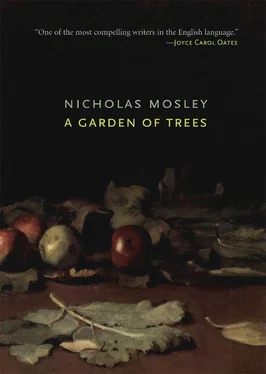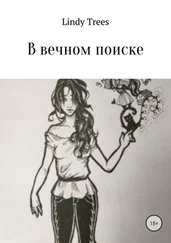“Of course they complain, they are suffocated, sat on, there is no gaiety any more.”
“For whom?” I said. “For you who still have money enough to create your own gaiety, or for those who have money for the first time and can’t?”
“And who are they sat on by,” Peter said, “other than the man in the taxi?”
“You are being ridiculous,” Alice said.
“I never did get the harm of that man in the taxi,” Peter said.
There was a silence. It seemed that the battle would drift on, interminably, and that no good would come of it. I realized, with surprise, that I had expected good to come of it. There is always the hope of results before a war. And now it seemed that at the end, as always, there would be no results except the weakening of all participants. I looked to Annabelle, but she was still withdrawn from us. I had given up trying to change the direction of the conflict myself. I regretted bringing Alice into such futility, and regretted even more that Annabelle would not help me. She seemed to be waiting for something. Peter was now doing the attacking with a persistence that was little different from Alice’s.
“I don’t trust all this gaiety stuff,” he said. “Cheap food, cheap drink, cheap talk, cheap women, cheap life — oh, I don’t believe in that sort of gaiety at all!”
“It was better than living in a dreadful concentration camp like this,” Alice said.
“A concentration camp?” Peter said. “Oh no, you can’t say anything about that, how can you talk about a concentration camp?”
“Don’t you know what I mean?” Alice said.
Marius came in. He said something about being sorry he was late, and sat down. Annabelle was kneeling on the floor in front of the fire, and she moved to make room for his legs. Alice watched her. Peter was standing by the piano, and it seemed then that what was happening was of more importance than a social battle. The nervousness had gone from Peter’s face, and in its place was a certain comical sadness which is the look of someone who has been hurt and is hiding it. I wondered how it was that Alice had hurt him, for her remark about a concentration camp had been no more, surely, than what he would expect; and then I realized, painfully, that the things that Alice had been saying — her phrases even — were those which Peter might well have said himself.
Realizing this, and watching Annabelle rather than Peter (she still had her back turned; why did she not speak?), I saw the alarm of having words thrown back at one in a way that made them hateful. Peter had spoken against England, but he had spoken against its pride and its complacencies, not its suffering. And now Alice had taken the words he might have used and had turned them into a complaint against the irrelevant lack of amenities. By doing this she had defeated him on the terms which they had accepted. The terms would now have to change — I did not know into what — but I found myself hoping.
“Oh Marius, darling,” Alice was saying, “thank heavens you are here. I am having another of these dreadful serious arguments with your friends. Do try and be amusing, darling, because this is such a lovely room. One really should not be serious in a room like this.” She turned to Annabelle. “Do you know what I mean?”
“We have not been so very serious, have we?” Annabelle said.
Alice laughed. “How right, how terribly right you are,” she said. “Oh Marius, darling, do give me a cigarette.”
The ground had already changed. Peter was out of it, solitary, and Annabelle and Marius were being engaged. Marius was getting the “darlings” as I once had done. Then Marius had been the enemy and the weapons of jealousy had been used against him. Now they were being used against Annabelle. She was sitting on the ground with her elbow touching Marius’s knee. I did not think words would hurt her.
“Do you know what suffering is?” Peter said.
“Tell me,” Alice said to Annabelle, “how long have you been living here?”
“About a year,” Annabelle said.
“And where were you before that?”
“We were abroad, with my father.”
“Oh yes.”
“There is no suffering except physical suffering,” Peter said.
“Nonsense,” Alice said. And then to Marius as he offered her a match—“Isn’t it nonsense, darling?”
“Sometimes,” Marius said.
“These cigarettes are like brown paper, where on earth do you get them?”
Peter walked over to me. He pointed at Marius. “He is betraying me,” he whispered loudly. Then he went back to the piano.
Alice was saying, “I am sure that sooner or later one will be poisoned by the cigarettes and drink that people give one.”
Peter played a note on the piano. “Anything but physical suffering you can change,” he said.
“A friend of mine went blind, literally, from drinking gin.”
“Then change it,” Annabelle said. Peter did not seem to hear her.
“He had to stay in bed for a week.”
“Suffering is when you can’t even die,” Marius said.
“How pompous, darling.”
“Yes,” Marius said.
Annabelle had gone back into her silence. Alice was looking at her restlessly as if she resented this. Peter banged again on the piano. “I expect he was blind already,” he said.
“Tell me,” Alice said, “does this go on all the time?”
“Not all the time,” Annabelle said.
Peter played a chord. “Did he think he had been put in a concentration camp when he drank the gin?”
“Doesn’t it get terribly on your nerves?” Alice said.
“We have no nerves,” Peter said furiously, shutting the lid of the piano.
“Marius,” Alice said, “how is your wife?”
The air had suddenly become difficult to breathe. There was a shock, an alarm, an embarrassment in the room that dared not be looked at. Annabelle had turned her head so that her hair fell downwards across her face, shutting it away from us, as if she were hiding herself from the thing that Alice’s words had created. Peter walked over to the window where he became a silhouette either approaching or receding, and it was only Marius who smiled into Alice’s eyes.
“I wondered if, when you saw her, you would give her my love.”
“Thank you,” Marius said.
I did not know about Marius’s wife. I did not know what anyone knew about Marius’s wife. The air was unbearable.
“I wondered how often you saw her now,” Alice said.
“I often see her,” Marius said.
“She is so lovely.” From where Alice was sitting she could not see Annabelle without turning to her, so after a while she did turn, and Annabelle was still leaning with her hair like a curtain over her face. “Don’t you think she is lovely?” Alice said.
“I have never seen her,” Annabelle said.
“Oh,” Alice said. “Oh haven’t you?” She gazed at Annabelle heavily, like a jealous sister.
I did not know who would ever speak next. I could not speak myself, for I did not know what was happening. The three who were sitting seemed frozen, enclosed, as if their hearts held their muscles rigid with waiting. Peter, by the window, seemed to be moving; although he never got any closer and never any farther away. He was like a ship on the horizon, which only proceeds when you cease to watch it. I looked down at the floor and tried not to think of Marius’s wife, not to feel anything, until I should know about her. I tried to think of how the embarrassment might be ended, but every second that it lasted seemed to show that the situation was final, the battle over, we had been defeated and there was nothing more to be done. I found that I was saying these words to myself over and over again — we have been defeated, we have been defeated — not knowing what I was meaning but feeling that the defeat was greater than on the simple terms on which we had begun. I felt that it was a vital defeat, a large-scale defeat, a defeat on our own terms (for why should there be such disaster at the mention of Marius’s wife?), and I was sensing the ruin of this, the outrage, when Annabelle shook the hair back from her face and stood up and walked over to Peter.
Читать дальше












